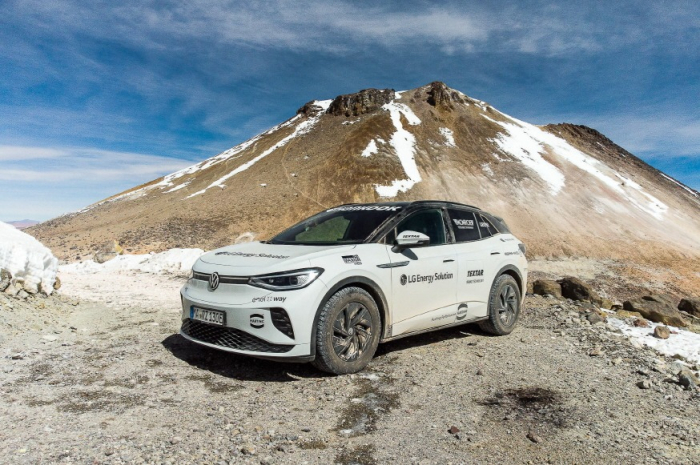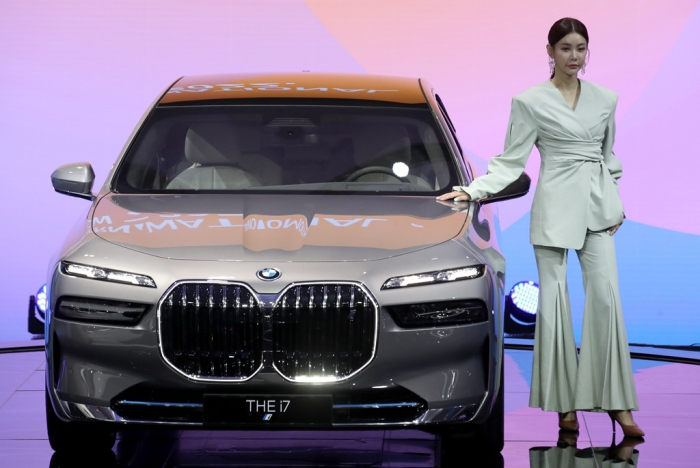Earnings
LG Energy lifts sales guidance; Samsung SDI sees firm growth
LG Energy revises down Q2 operating profit on higher one-off costs for Chevrolet Bolt EV recall
By Jul 27, 2023 (Gmt+09:00)
4
Min read
Most Read
LG Chem to sell water filter business to Glenwood PE for $692 million


KT&G eyes overseas M&A after rejecting activist fund's offer


Kyobo Life poised to buy Japan’s SBI Group-owned savings bank


StockX in merger talks with Naver’s online reseller Kream


Meritz backs half of ex-manager’s $210 mn hedge fund



South Korean electric vehicle battery maker are offered upbeat market outlooks, gaining structural growth momentum through strong competitiveness with the world’s second-largest cell manufacturer LG Energy Solution Ltd. raising its sales increase forecast and its smaller rival Samsung SDI Co. expecting healthy businesses.
LG Energy said on Thursday it revised its 2023 sales growth target to mid-30% from the previous forecast of a 25-30% increase unveiled in January, given its order backlogs of 440 trillion won ($344.2 billion), despite uncertainties in the global EV and battery industries.
“Despite some uncertainties expected in the second half, we are well positioned to ride out such challenges, as we have already secured a solid customer base and product portfolio through our long devotion to product competitiveness and operational expertise,” said LG Energy CEO Kwon Youngsoo in a statement.
The South Korean company said global EV demand forecasts were revised lower in all markets except the US. The world’s third-largest EV market is expected to keep growing, while demand in China and Europe, the two largest markets for the clean automobiles, are forecast to be lower than previous estimates, according to the company.
Prices of metals such as lithium tumbled more than 50% from their peaks earlier this year, which are predicted to be reflected in the average selling prices of batteries mainly from the second half, it added.
LG Energy is set to develop and produce customized products for each market to deal with such uncertainties. The company plans to set up production lines for at its plant a next-generation cylindrical battery with a 4680-cell form factor this year in Ochang, South Korea. It is also scheduled to convert some of the energy storage system (ESS) lines to lithium iron phosphate (LFP) battery lines at the Nanjing plant in China in the second half.
Q2 PROFIT REVISED DOWN
LG Energy logged an operating profit of 460.6 billion won in the second quarter on a consolidated basis, more than double 195.6 won a year earlier with sales soaring 73% to a quarterly record high of 8.8 trillion won.
The profit was revised down from a preliminary surplus of 611.6 billion won announced earlier this month, however.
Such a downward revision came as the company reflected one-off provisioning of 151 billion won caused by higher costs of raw materials for the ongoing recall of the Chevrolet Bolt EV, it said.
“In addition to the one-off cost related to the recall, the increased costs of metal expenses from lagging consumption of raw material inventories also affected our bottom line,” said LG Energy Chief Financial Officer Lee Cang Sil in a statement.
“However, we consistently improved productivity, as well as cost-efficiency for business operations including logistics, and accordingly, when the one-off factor is excluded, the operating profit margin saw significant year-on-year improvement.”
LG Energy’s shares closed down 6.9% to 540,000 won in the South Korean stock market, far underperforming a 0.4% gain in the main Kospi.
SAMSUNG SDI BENEFITS FROM STRONG HIGHER-END EV SALES
Samsung SDI, the world’s sixth-largest battery maker, said an operating profit grew 4.9% to 450.2 billion won in the second quarter on-year as sales jumped 23.2% to 5.8 trillion won.
“The medium and large-sized battery business with strong sales of EV batteries led the healthy earnings,” a Samsung SDI official said. “Sales of high-value products, especially prismatic P5 batteries, significantly increased."

The South Korean cell manufacturer’s clients included premium brands such as BMW.
Samsung SDI expected both sales and profits to increase as the battery sector is likely to accelerate momentum thanks to strong EV and ESS industries despite uncertainties about slowing global economic growth.
The company plans to operate new production lines in Hungary to meet demand in a timely manner.
Samsung SDI and Dutch-domiciled multinational automaker Stellantis N.V. agreed to build their second joint battery plant in the US in a move to benefit from Washington’s policy that favors products made in the country or its trading partners.
The Inflation Reduction Act (IRA) grants up to $7,500 per EV to customers if the clean vehicle is assembled in the US and the battery's minerals are mined or processed in the country or its free trade partners.
Washington requires that 40% of the value of critical battery minerals be sourced from the US or its free trade partners and 50% of the value of battery components be produced or assembled in North America to qualify for an EV tax credit.
The IRA added a new advanced manufacturing production credit (AMPC) with respect to “eligible components” produced in the US or a possession. The US government is set to provide $35 per kilowatt-hour (kWh) to battery cells made in the US and $10 per kWh to modules.
Samsung SDI also plans to start producing 46-millimeter cylindrical batteries, which are larger than existing cells, in the second half. The company is set to manufacture prototypes for customers of solid-state batteries, a game change in the EV sector.
Write to Sungsu Bae at baebae@hankyung.com
Jongwoo Cheon edited this article.
More to Read
-
 BatteriesLG Energy triples lithium orders from SQM for US benefits
BatteriesLG Energy triples lithium orders from SQM for US benefitsJul 07, 2023 (Gmt+09:00)
2 Min read -
 BatteriesSamsung SDI, Stellantis agree to build 2nd US battery plant
BatteriesSamsung SDI, Stellantis agree to build 2nd US battery plantJul 24, 2023 (Gmt+09:00)
2 Min read -
 BatteriesLG Energy's Ochang plant, Korea's EV cell mother factory
BatteriesLG Energy's Ochang plant, Korea's EV cell mother factoryMay 25, 2023 (Gmt+09:00)
3 Min read -
 BatteriesLG Energy to spend $3.1 bn on 4680 battery plant in S.Korea
BatteriesLG Energy to spend $3.1 bn on 4680 battery plant in S.KoreaDec 19, 2022 (Gmt+09:00)
1 Min read -
 BatteriesSamsung SDI in talks with multiple carmakers for 4680 type battery supply
BatteriesSamsung SDI in talks with multiple carmakers for 4680 type battery supplyJul 29, 2022 (Gmt+09:00)
4 Min read -
 IPOsLG Energy Solution’s IPO plan remains elusive after GM recall settlement
IPOsLG Energy Solution’s IPO plan remains elusive after GM recall settlementOct 13, 2021 (Gmt+09:00)
3 Min read
Comment 0
LOG IN


